Each and All
中考英语总复习之主谓一致-详解与练习
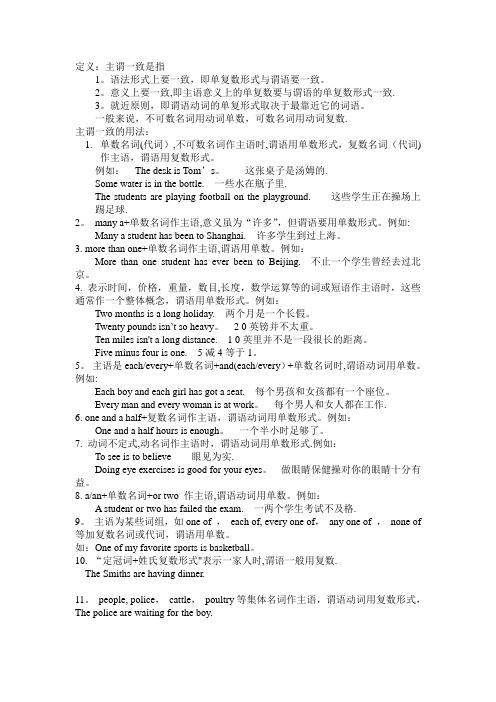
定义:主谓一致是指1。
语法形式上要一致,即单复数形式与谓语要一致。
2。
意义上要一致,即主语意义上的单复数要与谓语的单复数形式一致.3。
就近原则,即谓语动词的单复形式取决于最靠近它的词语。
一般来说,不可数名词用动词单数,可数名词用动词复数.主谓一致的用法:1.单数名词(代词),不可数名词作主语时,谓语用单数形式,复数名词(代词)作主语,谓语用复数形式。
例如:The desk is Tom’s。
这张桌子是汤姆的.Some water is in the bottle. 一些水在瓶子里.The students are playing football on the playground. 这些学生正在操场上踢足球.2。
many a+单数名词作主语,意义虽为“许多”,但谓语要用单数形式。
例如: Many a student has been to Shanghai. 许多学生到过上海。
3. more than one+单数名词作主语,谓语用单数。
例如:More than one student has ever been to Beijing. 不止一个学生曾经去过北京。
4. 表示时间,价格,重量,数目,长度,数学运算等的词或短语作主语时,这些通常作一个整体概念,谓语用单数形式。
例如:Two months is a long holiday. 两个月是一个长假。
Twenty pounds isn’t so heavy。
2 0英镑并不太重。
Ten miles isn't a long distance. 1 0英里并不是一段很长的距离。
Five minus four is one. 5减4等于1。
5。
主语是each/every+单数名词+and(each/every)+单数名词时,谓语动词用单数。
例如:Each boy and each girl has got a seat. 每个男孩和女孩都有一个座位。
every和each用法上的区别
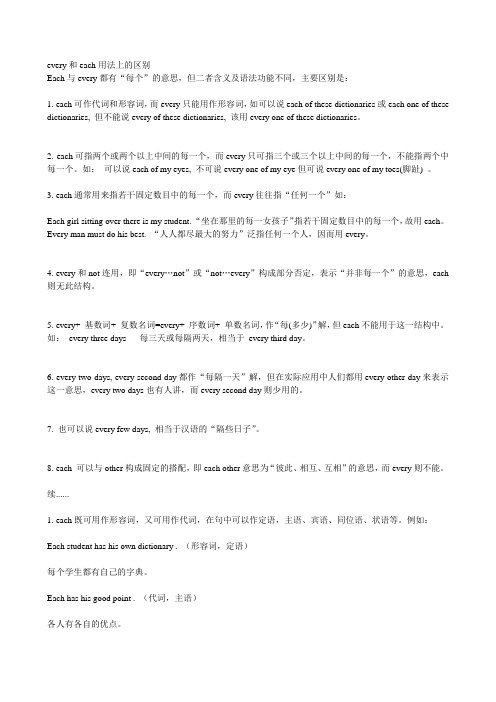
every和each用法上的区别Each与every都有“每个”的意思,但二者含义及语法功能不同,主要区别是:1. each可作代词和形容词,而every只能用作形容词,如可以说each of these dictionaries或each one of these dictionaries, 但不能说every of these dictionaries, 该用every one of these dictionaries。
2. each可指两个或两个以上中间的每一个,而every只可指三个或三个以上中间的每一个,不能指两个中每一个。
如:可以说each of my eyes, 不可说every one of my eye但可说every one of my toes(脚趾) 。
3. each通常用来指若干固定数目中的每一个,而every往往指“任何一个”如:Each girl sitting over there is my student. “坐在那里的每一女孩子”指若干固定数目中的每一个,故用each。
Every man must do his best. “人人都尽最大的努力”泛指任何一个人,因而用every。
4. every和not连用,即“every…not”或“not…every”构成部分否定,表示“并非每一个”的意思,each 则无此结构。
5. every+ 基数词+ 复数名词=every+ 序数词+ 单数名词,作“每(多少)”解,但each不能用于这一结构中。
如:every three days 每三天或每隔两天,相当于every third day。
6. every two days, every second day都作“每隔一天”解,但在实际应用中人们都用every other day来表示这一意思,every two days也有人讲,而every second day则少用的。
every_each_区别

every,each的区别两者都有“每个”的意思,但用法不同:(1)each具有名词和形容词的功能,every只有形容词的功能。
(2)each指两个或两个以上的人或事物中的“每个”;every是指三个以上的人或事物的“全体”,和all的意思相近。
如:He gave a book to each of his parents. 他给他父母各送了一本书。
Every comrade was there and each did his work. 每个同志都在那儿,各人做各人的工作。
(3)every总是修饰单数名词,后接单数动词。
(不可单独使用,后面必须加名词〈只能在句中做定语〉,名词用单数)不可以和of连用,但every one(分开写)可以和of连用。
every man and woman knows that. 每个男人和女人都知道那事。
(4)each(可单独使用)。
可以和of连用。
作为形容词,修饰单数名词,接单数动词。
作为代词,单独使用,接单数动词;放在复数名词和代词后作同位语,接复数动词。
each of them后可接单数或复数动词。
如:Each man carries his own bag. (修饰单数名词)各人背自己的包。
We each have our own office. (作We的同位语)我们各有各的办公室。
Each carries his own bag. (代词)各人背自己的包。
Each of them are/is here. (代词)他们每个人都在这儿。
(5)代表each和every的物主代词可以用his, 也可以用their。
如:Each carried their/his own bag. 各人背他们/他自己的包。
(6)都可修饰人或物each可作同位语,主语和宾语。
Every只能做定语,后面必须跟名词Each作同位语时,谓语动词应和主语保持一致。
They both came on time , but each left ahead of time.他们两个按时到达,但都提前离开了。
初中英语each与every的区别
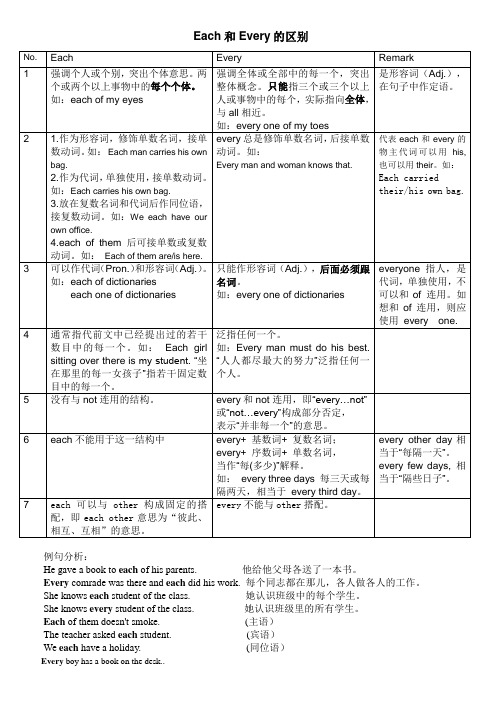
Each和Every的区别例句分析:He gave a book to each of his parents. 他给他父母各送了一本书。
Every comrade was there and each did his work. 每个同志都在那儿,各人做各人的工作。
She knows each student of the class. 她认识班级中的每个学生。
She knows every student of the class. 她认识班级里的所有学生。
Each of them doesn't smoke. (主语)The teacher asked each student. (宾语)We each have a holiday. (同位语)Every boy has a book on the desk..each与every都可用作形容词,在句中作定语,但each更强调个人或个别,every更强调全体或全部。
each指两个或两个以上的人或事物中的“每个”;every是指许多人或事物的“全体”,与all的意思相近。
1. each可作代词和形容词,而every只能用作形容词,如可以说each of these dictionaries或each one of these dictionaries, 但不能说every of these dictionaries, 该用every one of these dictionaries。
2. each可指两个或两个以上中间的每一个,而every只可指三个或三个以上中间的每一个,不能指两个中每一个。
如:可以说each of my eyes, 不可说every one of my eye但可说every one of my toes(脚趾) 。
3. each通常用来指若干固定数目中的每一个,而every往往指“任何一个”如:Each girl sitting over there is my student. “坐在那里的每一女孩子”指若干固定数目中的每一个,故用each。
Each 的用法

Each 的用法一、each作“各自的”,“每个的”解,作形容词用:1.There are many trees on each side of the river.河流两岸许多树。
2.Each element has some special properties.每种元素都有些特殊性质。
二、作“各自”、“每个”讲,作代词用:1.Each has his advantages.各人都有其优点。
2.He gave each of us a tool.他给我们每人一件工具。
三、作“各自地”讲,作副词用:1.Give them two books each.(=Give each of them tw o books.)给他们每个人两本书。
2.The students have ten books each.(=Each of the students has ten books.)这些学生每人有十本书。
3.Different kinds of waves have each the same threecharacteristics: amplitude,frequency and length.不同的波(各)都有三个相同的特性:幅度、频率和波长。
(each在此修饰主语waves)四、注意each作同位语的用法:1.They each put forward a proposal.他们每人提出一条建议。
(each此处紧挨代词they,是they的同位语)2.The workers are each of them hard-working.这些工人个个勤奋劳动。
(each of them整个形式名词做the worker s的同位语)注:同位语——一个名词(或其它形式)对另一个名词或代词进行修饰,限定或说明,这个名词(或其它形式)就是同位语。
同位语与被它限定的词的格要一致,并常常紧挨在一起。
五、each other作“互相”、“彼此”解:1.We help each other.我们互相帮助。
each、every,any,either的区别、用法、详细解答、练习及练习详解(敢说网上最详细、最透彻的)教学文案
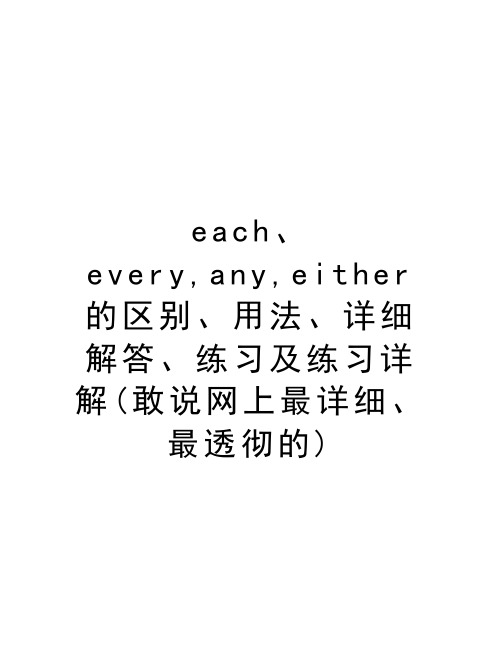
e a c h、e v e r y,a n y,e i t h e r 的区别、用法、详细解答、练习及练习详解(敢说网上最详细、最透彻的)each和every都有“每个”的意思,但它们在用法上有所不同▲each着重于个别的含义。
every着重于全体的含义,和all的意思相近。
例如:Each student has an English book. 每个学生都有一本英语书。
Every student must study well.每个学生都必须好好学习。
第二个例句中的every student相当于all the students▲each可以用来指两或两个以上的人或东西,但every却总是三个以上的人或东西,不能指两个。
如:可以说each of my eyes, 不可说every one of my eye但可说every one of my toes(脚趾) 。
试译:街道两旁有许多商店。
误:There are many shops on every side of the street.正:There are many shops on each side of the street.误:I gave a present to every one of her parents .正:I gave a present to each of her parents .▲a day=each day(≠every day)①牛津高阶中:every的解释:to refer to groups of three or more which are seen as wholes 与单数可数名词连用, 指至少三个, 视为一整体) 每个; 所有的; 一切的: Every child in the class passed the examination. 班上所有的学生考试都及格了. * I've got every record she has ever made. 我已得到她灌的所有的唱片. * I couldn'thear every word of his speech. 他讲的话并非每句我都能听见. * He examined every item in the set carefully. 他仔细检查了这一套中的各项.② each :every individual member (of a group) 每个: each of the boys, books, buildings 每个男孩﹑每本书﹑每座建筑物 * Each of them phoned to thank me. 他们每个人都打电话来向我道谢. * Each of us has a company car. 我们每人都有一辆公司的汽车. I'll see each of you separately. 我要分别地见你们每一个人. He gave us 5 each. 他给我们每人5英镑.③综上,each day 和every day 不是一个意思,换句话说能用each day的地方不能用every day; 能用every day的地方不能用each day.Women generally use up about 2000 calories a day (=each day) .Since I had the accident, I've learned to take each day as it comes.(强调“每一天”,不能换成every day)Let's go out and celebrate. After all, it's not every day you get a new job.Every day is a new day.▲every只能是形容词,用作定语,each既可用作形容词,又可用作代词,在句中可以作定语,主语、宾语、同位语、状语等。
Each 的用法
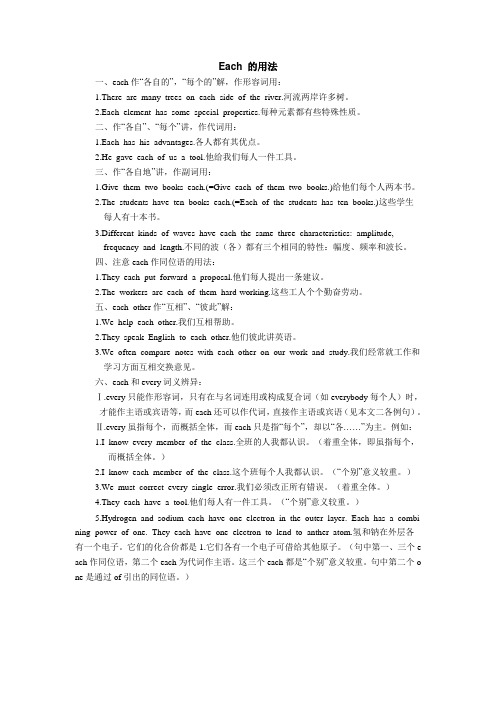
Each 的用法一、each作“各自的”,“每个的”解,作形容词用:1.There are many trees on each side of the river.河流两岸许多树。
2.Each element has some special properties.每种元素都有些特殊性质。
二、作“各自”、“每个”讲,作代词用:1.Each has his advantages.各人都有其优点。
2.He gave each of us a tool.他给我们每人一件工具。
三、作“各自地”讲,作副词用:1.Give them two books each.(=Give each of them two books.)给他们每个人两本书。
2.The students have ten books each.(=Each of the students has ten books.)这些学生每人有十本书。
3.Different kinds of waves have each the same three characteristics: amplitude,frequency and length.不同的波(各)都有三个相同的特性:幅度、频率和波长。
四、注意each作同位语的用法:1.They each put forward a proposal.他们每人提出一条建议。
2.The workers are each of them hard-working.这些工人个个勤奋劳动。
五、each other作“互相”、“彼此”解:1.We help each other.我们互相帮助。
2.They speak English to each other.他们彼此讲英语。
3.We often compare notes with each other on our work and study.我们经常就工作和学习方面互相交换意见。
every和each

every和each同属中位限定词,都可与单数名词连用,且意义相近,表示‘每个’,然而every和each并不完全一样,every强调整体概括,each则表示个别概念。
例如:Each day is better than the one before.一天比一天好。
Every player was in good form.每个运动员都处于最佳状态。
如果不特别强调某一意义时,every和each可以互换。
例如:We want every child to succeed.我们希望每个孩子都成功。
Each child will find his own personal road to success.每个孩子将会找到他个人的成功之路。
each可以指两个或两个以上的人或东西,every却不能指两个,只能指三个以上的数量。
例如:Each sex has its own physical and psychological characteristics.男女各有其身体上和心理上的特点。
(不能说every sex...)另外,如有其他限定词同时修饰中心词,each可作代词取each of的形式,而every 则只能作限定词。
例如:Each of my parents gave me presents for Christmas.过圣诞节时我父母每人都给我送了礼物。
each和every 一般都作限定词,用语单数可数名词前.each用以指一个群体(至少有两个)中个别的个体.every指一个群体(至少有三个)中侧重于全体的所有个体,而不在个别的个体,它可以受某些副词修饰.For example:Each child has an apple in the family.每个孩子均都有一个苹果.Every student has a new book.每个学生都有一本新书.也就是说它们两个的侧重点不一样。
"Each child has an apple," is not a very good sentence. It sould beEach child has ONE apple.(sounds better)Or, Every child has an apple.Each侧重What the child has,what status. One apple? Two Apples? or Three Apples? Every 侧重which type of people, or which people have the status.Every child? Half of the child? or boys?"each一般指两人而every是指三人以上的" = NONSENSE AT ALLExample,Each ticket cost . There may be 1000 tickets.当有人问门票多少钱时,他侧重一张票的价格.所以回答是: EACH ticket costs .当有人觉得别是买票便宜,对自己不公平的时候,他会问是不是票分等级,或直接问为什么不公平.这时他想知道(侧重)哪些票是.回答是:EVERY ticket costs .EACH可以做形容词,副词,及代词,而EVERY只能做形容词。
every与each的区别

Every 和each1.两个词都表示“每个”,each 既可以作限定词,也可以作代词,而every 则只能作限定词。
例:Each (man) knows what to do. 每个人都知道该做什么。
Every man knows what to do. 人人都知道该做什么。
注意:限定词是在名词词组中出现在名词(和形容词)之前对名词的所指意义起限定作用的词类。
(只供了解,如果感兴趣可以查查,有很多我们学过的词属于限定词。
如:冠词等)2.从语义上看,each表示的“每个”侧重于“各别”;every表示的“每个”侧重在“全体”,尤其是许许多多人或物的“全体”。
比较:I interviewed them one by one ,and each(man) knows what to do .我逐一访谈,每个人都知道该做什么。
I interviewed all of them, and every man knows what to do.我采访了所有人,大家都知道该做什么。
在这里,every man knows what to do 相当于all the man knows what to do3.each通常指“两个”或“两个以上”人或物中的每个,而every则指“多于两个”人或物中的“每个”。
例如我们可以说On each side of the street 却不能说On every side of the street,因为街道只有两边。
但如果说广场的每一边,就可以用each,也可用every,因为广场是多边的。
3.each 作为代词,可以作主语、宾语、同位语等。
例:Each of the clerks has a desk of his own.(each 作主语)每位职员各有自己的办公桌。
Several pupils came, and I gave each a notebook.(作宾语)来了几个小学生,我给每人一个笔记本。
总结all--both--every--each--either--neither的区别 (1)

all, both, every, each, either, neither的区别1.all, both从意义上讲both指两者,all指三者或三者以上。
如:All flowers in his garden are red.他花园里的花都是红色的。
My parents are both doctors我的父母都是医生。
(父母两者)另外,表示部分否定的词还有every (everyone)。
例如:Every man can not be a poet.并非人人都可以成为诗人。
要表达全部否定要用none / no (nobody) , neither, either等。
例如:I cannot promote either of you.你们两个我都不能提拔。
No flower in his garden is red.他花园的花都不是红的。
2.all和every从意义上十分相近,都用来泛指人或物,然而两者各自与名词搭配的类别不同,every只能与单数可数名词连用。
如:All Mondays are horrible.(= Every Monday is horrible. )all后可以跟the或this, my等限定词,而every却不行。
例如:All the boys of this class are able to run faster than their teacher.试比较:She was here all day.她在这里呆了一整天。
She was here every day. 她天天都在这里。
3.every和each同属中位限定词,都可与单数名词连用,且意义相近,表示‘每个’,然而every和each并不完全一样,every强调整体概括,each则表示个别概念。
例如:Each day is better than the one before.一天比一天好。
Every player was in good form.每个运动员都处于最佳状态。
Each与every

Each与everyEach与every都有“每个”的意思,但二者含义及语法功能不同,主要区别是:一、1. each既可用作形容词,又可用作代词,在句中可以作定语,主语、宾语、同位语、状语等。
例如:1.Each student has his own dictionary . (形容词,定语)2.Each has his good point . (代词,主语)3.Our headteacher had a talk with each of us . (代词,宾语)4.The students each have a desk . (代词,同位语,不影响谓语动词的单复数)5.The children can have a bag each . (副词,状语)二. each与every都可用作形容词,在句中作定语,但each更强调个人或个别,every更强调全体或全部。
比较:I know each member of your family .我认识你们家的每个成员。
I know every member of your family .我认识你们家的每个成员。
三. each指两个或两个以上的人或事物中的“每个”;every是指许多人或事物的“全体”,与all 的意思相近。
试译:这条街上每边都有很多商店。
[误]There are many shops on every side of the street .[正]There are many shops on each side of the street .我给她父母每人一件礼物。
[误]I gave a present to every one of her parents .[正]I gave a present to each of her parents .四. each 单独作主语或each、every修饰的单数名词作主语时,谓语动词为单数形式,但ea ch of them作主语时,谓语动词用单数或复数形式都可以。
不定代词

none 意为"没有一个人或东西",在句中可以作主语, 宾语及同位语,但它不能作定语. 1. ---Are there any maps on the walll? ---None 2. I like none of these books None of 后面只能接可数名词复数,但谓语动词用单,复数均可, 强调整体时谓语动词常用复数,强调个体时谓语动词常用单数. None of these pictures are/is good. None of them like it. None of us has got a car. 注意:回答how many或how much问句时通常用none回答. ---How many students are there in the classroom? ---None. ---Who is in the classroom ? ---No one/Nobody
当all用作主语时,如果后面有人称代词,须 在他们之间加上of,如果后面跟的是名词, 他们之间可加of,也可不加. All of them are from Beijing. All the students/All of the students have passed the exam.
1. All "所有",谈到三个或三个以上的人或物时以及在 谈到不可数的事物时.当作主语指人时,谓语动词用复 数形式;当作主语指物时,谓语动词用单数形式;当作定 语时,它既可修饰可数名词,又可修饰不可数名词.
All of us are interested in English. All is going well. They all went there and bought some books last week. He told me all about it. 注意:All of us are not students.是"我们大家 并不都是学生"之意.暗示:我们当中有一些 是学生,有一些不是.句型Not all…或为 All…not不完全否定句.
all,both,every,each,either,neither的用法[详解]
![all,both,every,each,either,neither的用法[详解]](https://img.taocdn.com/s3/m/8322b83dcec789eb172ded630b1c59eef8c79a68.png)
all, both, every, each, either, neither的用法all, both, every, each, either, neither的用法1.all, both同属前位限定词,但all可以与三类名词搭配,both只能与复数可数名词搭配,从意义上讲both指两者,all指三者或三者以上。
如:How much time will you take for all this work?All children can be naughty sometimes.I got both these vases in Spain.Both cats are asleep.all和both用于否定时表示部分否定。
例如:I cannot promote both of you.我不能使你们两个都提升。
All flowers in his garden are not red.他花园里的花并非都是红色的。
Both (of them) are not my brothers.他们两个之中,只有一个是我的兄弟。
另外,表示部分否定的词还有every (everyone)。
例如:Every man can not be a poet.并非人人都可以成为诗人。
要表达全部否定要用none / no (nobody) , neither, either 等。
例如:I cannot promote either of you.你们两个我都不能提拔。
No flower in his garden is red.他花园的花都不是红的。
2.all 和every从意义上十分相近,都用来泛指人或物,然而两者各自与名词搭配的类别不同,every只能与单数可数名词连用。
如:All Mondays are horrible.(= Every Monday is horrible. )all后可以跟the或this, my等限定词,而every却不行。
高二英语不定代词each、every的用法单选题40题
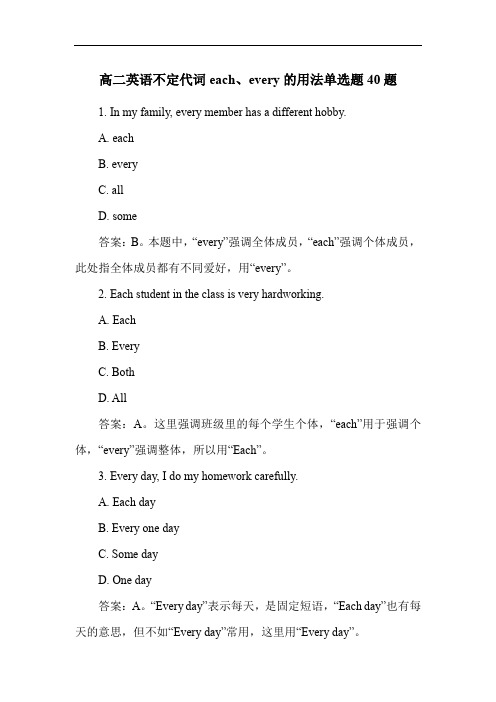
高二英语不定代词each、every的用法单选题40题1. In my family, every member has a different hobby.A. eachB. everyC. allD. some答案:B。
本题中,“every”强调全体成员,“each”强调个体成员,此处指全体成员都有不同爱好,用“every”。
2. Each student in the class is very hardworking.A. EachB. EveryC. BothD. All答案:A。
这里强调班级里的每个学生个体,“each”用于强调个体,“every”强调整体,所以用“Each”。
3. Every day, I do my homework carefully.A. Each dayB. Every one dayC. Some dayD. One day答案:A。
“Every day”表示每天,是固定短语,“Each day”也有每天的意思,但不如“Every day”常用,这里用“Every day”。
4. Each of the girls has a beautiful dress.A. EachB. EveryC. AllD. None答案:A。
“Each of + 复数名词”表示“……中的每个”,强调个体,“Every”不与“of”连用,所以用“Each”。
5. We have every kind of fruit in the basket.A. eachB. everyC. allD. some答案:B。
“every kind of”表示“每种”,“each”通常不与“kind of”搭配,用“every”。
6. Each of the students has/have a book.A. hasB. have答案:A。
本题考查“each of + 复数名词”作主语时,谓语动词用单数形式。
英语全家福作文及翻译
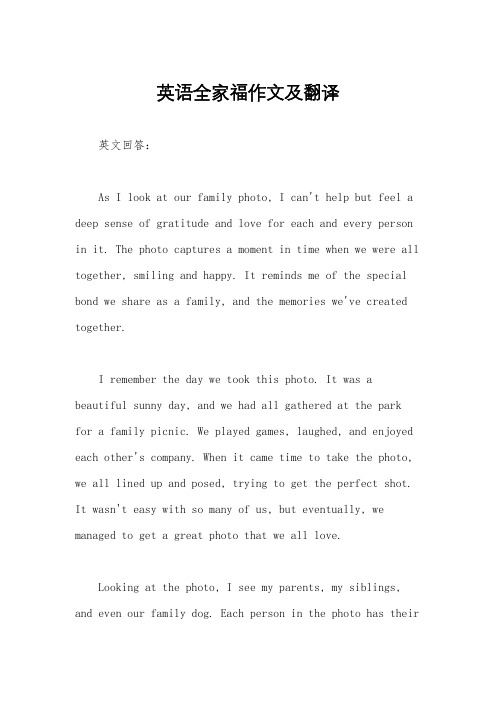
英语全家福作文及翻译英文回答:As I look at our family photo, I can't help but feel a deep sense of gratitude and love for each and every person in it. The photo captures a moment in time when we were all together, smiling and happy. It reminds me of the special bond we share as a family, and the memories we've created together.I remember the day we took this photo. It was a beautiful sunny day, and we had all gathered at the parkfor a family picnic. We played games, laughed, and enjoyed each other's company. When it came time to take the photo, we all lined up and posed, trying to get the perfect shot. It wasn't easy with so many of us, but eventually, we managed to get a great photo that we all love.Looking at the photo, I see my parents, my siblings, and even our family dog. Each person in the photo has theirown unique personality and quirks, but together, we make a perfect team. We may not always see eye to eye, but at the end of the day, we know that we can always count on each other.中文回答:当我看着我们的全家福照片时,我不禁感到对每个人都充满了深深的感激和爱。
初三英语比较级和最高级构造练习题30题

初三英语比较级和最高级构造练习题30题1<背景文章>There are three remarkable cities in the world. City A, City B, and City C. Each city has its own unique characteristics.City A is known for its large population. It has a population of over five million people. In terms of area, it is relatively smaller compared to City B and City C. However, its economic development is quite remarkable. The industries in City A are diverse and contribute significantly to the country's economy.City B, on the other hand, is the largest in terms of area. It covers a vast expanse of land. The population of City B is around four million. Although its economic development is not as fast as City A, it has great potential. The city is rich in natural resources and is working hard to boost its economy.City C is a major economic hub. It has a population of around three million. While it is smaller in size compared to City B, its economic strength is undeniable. The city is known for its advanced technology and high-quality education.In conclusion, each city has its own advantages and disadvantages. They are all important in their own ways.1. Which city has the largest population?A. City AB. City BC. City CD. None of the above答案:A。
不定代词 一页

8) none:not any毫无,没有人,没有任何东西。
9) other: the second of two两者中的另一个,其余的。
10)the other: the second of the two
11)another: one of others,one more of the same kind同类里的另一个。
部分较难不定代词区别图标
1.不定代词的数量概念:
含义
数概念
全部
都
任意一个
(全无)
都不
每一个
只指两者
both
either
neither
each
指三者以上
all
any
none
each,every
2.不定代词的词性
不定代词
词性
成份
every
adj.
定语
后面只跟
单数名词
none
n.
主
表
宾
它不能做
名词的定语,
只与of连用
either
each
neither
both
all
n.
或
adj.
主
表
定ቤተ መጻሕፍቲ ባይዱ
either
each+单数名词
neither
both+复数名词
all
3.解释
1) each: every single one of two or more把任何数目人或东西分开来看。
2) every: each or all (of more than two)强调一个整体
3) either: one or the other of two两者任一。
- 1、下载文档前请自行甄别文档内容的完整性,平台不提供额外的编辑、内容补充、找答案等附加服务。
- 2、"仅部分预览"的文档,不可在线预览部分如存在完整性等问题,可反馈申请退款(可完整预览的文档不适用该条件!)。
- 3、如文档侵犯您的权益,请联系客服反馈,我们会尽快为您处理(人工客服工作时间:9:00-18:30)。
夕阳染红的景色中
喉揺らして 本当に伝えたかったことを
nodoyurashite hontouni tsutae ta katta kotowo
歌喉颤动 我歌唱出真心企盼传达之事,
君の声とか谁かの声とは违う
kimino koetoka dareka no koe to wachigau
用这不同于你或他人的
畏惧着光,
じっと呼吸を 空に纷らわせてた
jitto kokyuuwo sorani magira waseteta
呼吸无声地散入空中
嗫きほどの声を
sasayaki hodo no koewo
如同耳语般的声音
谁かの影の中に
darekano kageno nakani
渗ませてた
nijimaseteta
私だけに生まれた音色で
watashi dakeni umareta neiro de
只有我才能发出的音色
それぞれが描き
sorezore gaegaki
愿望化作梦想
愿う梦は少しずつ违うから
neau kara
每人描绘的都有些许不同
それが全てじゃなくても
sorega subete janakutemo
即便这份真实并非全部
朱く染まる街は私に呟く
akaku somaru machiwa watashi ni tsubuyaku
夕阳染红的街道向我低语,
喉震わせ 伝えないままに怯えてくの?
nodo furuwase tsutaenai mamani obiete kuno?
ぶつかり轧む音も
butsukari kishimuo tomo
即便冲突摩擦弥漫双耳
この耳をふさがずに
kono mimiwo fusagazuni
厌わないで
itowa naide
也不要拒绝倾听
谁だって
dare datte
真実を胸に
shinjitsu wo muneni
无论是谁,都将真实寄于心中
任谁都不会听见
朱く染まる景色に私は歌う
akaku somaru keshikini watashi wa utau
夕阳染红的景色中,我歌唱着
込めた想い 全てが伝わらなかったとしても
kome tao moi subetega tsutawara nakatta toshi temo
即便蕴含的感情丝毫无法传达
Each and All
作词 / 作曲 / 编曲:kz
歌:livetune adding Rin Oikawa (from Q;indivi)
Album: TVアニメ「DEVIL SURVIVOR2 THE ANIMATION」OPテーマ「Take Your Way」
光を怖れて
hikariwo osorete
谁の声でもなく私が响かせる
dare no koe de mo naku watashi ga hibi kaseru
这唯我所有的发自内心深处的音色
胸の奥に生まれた音色で
mune no okuni umareta neiro de
也会响彻四方,
君が呼んだ声に応えるよ
kimiga yonda koeni kotae ruyo
沁入不知何人的身影中
暖かな
atata kana
幻想は终わる
gensou wa owaru
沈む太阳とともに
shizu mu taiyou totomoni
伴随着落日,温暖的幻想已结束
朱く染まる景色に私は歌う
akaku somaru keshikini watashi wa utau
zutto furi tsumotta
感情の欠片たち
kanjyou no kakera tachi
一直以来如雪般降落堆积的感情碎片
「届いて」と
todoite to
希っただけでは
koine gatta dakedewa
若只是祈求「传达到吧」
谁にも 闻こえはしないから
dare nimo kikoe wa shinaikara
嗓音颤抖,尚未传达就先胆怯了吗?
血が渗んでも 进む先が荆でも
chiga nijin demo susumu sakiga ibara demo
即便遍体鳞伤,即便前方荆棘遍布
君が呼んだ声に応えるよ
kimiga yonda koeni kotaeruyo
我也要回应你的呼唤
ずっと降り积もった
